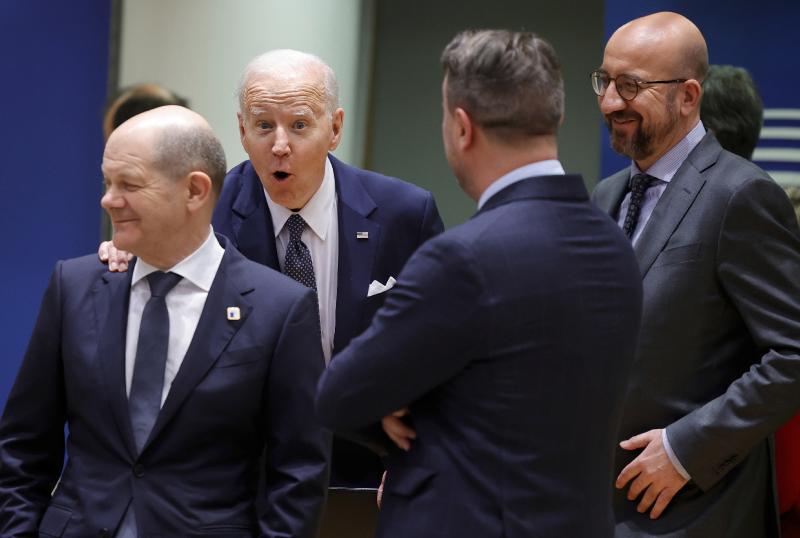How Joe Biden suckered Europe
By: Marwan Bishara (Al Jazeera)


Europe has fallen and can't get up. How much is this going to cost American taxpayers?
Biden is only following the easiest path. The Cold War did establish stability in Europe. Europe would whine and bicker among themselves. The United States would intervene because Russia was the world's greatest threat. Now we know that Russia was just a bogeyman used to pump American taxpayer cash into the pockets of European oligarchs. The PIIGS were so happy.
The Ukrainian War has turned into another European global war. Moscow is a European city, after all. History really does show that Europe cannot live with itself. And that's not America's fault. Yet, somehow, Europeans think that it's America's responsibility to fight their wars.

Europe is lost for answers.
Ever since Russia took Europe by surprise in Ukraine, America has taken its transatlantic partner for granted. With a new type of cold war emerging between Moscow and Washington, the continent has been left in the cold, literally and figuratively.
Dumbstruck and destabilised, the European Union has been divided over how to respond to this new superpower rivalry. Though determined to support Ukraine's fight for freedom and independence from Russia, Europeans have also been trapped by its consequences.
Some, like Hungary, want some form of accommodation for Russia, while others, like Sweden and Poland, want greater accommodation for America. But the continent's political and economic power brokers are seeking greater independence from both.
France and Germany, who have long opposed US pressure to expand NATO into Ukraine, are furious at the Biden administration's manipulative use of the Russia scare to advance America's interest at the expense of their own.
But America is not letting go and is pushing for a Cold War-style security structure in Europe. As I write these lines, Secretary of State Antony Blinken is leading a NATO foreign ministers' meeting in Romania, where some 3,000 US troops are stationed and where, in the 2008 NATO Summit, the US pushed hard for the expansion of the alliance to Ukraine, to the consternation of its major allies.
The Atlanticist British magazine, the Economist, reports that "American economic populism and geopolitical rifts threaten the long-run competitiveness of the European Union", and it warns that, "it is not just the continent's prosperity that is at risk, the health of the transatlantic alliance is, too".
Germany, which has grown dependent on Russia for energy and on China for exports and investments, is unhappy with US attempts at severing or limiting Western economic relations with Moscow and Beijing. Chancellor Olaf Sholz's visit to China earlier this month aimed to restore certainty and stability in German-Chinese relations.
Berlin may have succeeded in filling up its gas storage for this winter, but the energy squeeze and skyrocketing prices are undermining German and other European economies. With gas prices six times higher than their long-term average and Russian gas supplies to Europe significantly diminished, it is not clear how the continent will survive 2023.
Indeed, the energy crunch, combined with a cold winter, could cause more than 100,000 extra deaths across Europe - more than the number of military deaths in Ukraine. But instead of helping its allies tackle the energy crisis, the US is charging Europeans almost four times more for natural gas than in domestic sales.
Meanwhile, Biden's Inflation Reduction Act, which is showering US corporate giants with hundreds of billions of dollars in subsidies, is undercutting their European competitors, while his populist "made-in-America" drive is undermining transatlantic trade.
All of this has provoked the Europeans to accuse America of profiteering from the war and hoovering up their investments, while undermining fair and free trade. In short, they accuse it of replicating China's policies, which begs the question: with a friend like that, who needs Beijing?
Such is the unfolding transatlantic drama, which prompted French President Emmanuel Macron to call on the EU to "wake up" because "neither the Americans nor the Chinese will cut us any slack". Other European leaders have demanded that Washington consult and coordinate with its European partners before taking strategic decisions that are vital for their survival or that of the transatlantic alliance.
Alas, these nations are hardly coordinating and consulting among themselves, let alone uniting behind a common strategy worthy of the great challenge they all face from the new global power struggle.
The British exit from the EU, the heated bickering between France and Italy, the persistent tensions between Western and Eastern Europe, and the cooling of relations between France and Germany, are not helping. The 27 EU member states may not all agree to act in unison, but Paris and Berlin must do so if they are to succeed in tackling the crisis.
And yet, President Macron and Chancellor Scholz have thus far failed to work together, as their predecessors did quite successfully during and after the Cold War: from Valery Giscard d'Estaing and Helmut Schmidt, to Francois Mitterrand and Helmut Kohl, Jacques Chirac and Gerhard Schroeder, and even Macron and Angela Merkel. This is leaving Europe vulnerable, divided and exposed.
America has not hesitated to bank on European inaction and division. Paradoxically, Biden, who promised to restore confidence to the transatlantic partnership, is creating a transatlantic crisis of confidence.
Indeed, his tight embrace of Europe is posing a greater challenge to European cohesion than George Bush's belligerence, Barack Obama's indifference, and Donald Trump's hostility and resentment. The fact that Biden is acting surprised by Europe's reaction or playing ignorant of its resentment, adds insult to injury.
For all practical purposes, it feels like Biden is doing to Europe today what former American presidents did at the height of the Cold War, namely keeping Russia out, Germany down, France on the sidelines, and the US, well, right at the centre.
For more than a century, America has repeatedly intervened in Europe, including fighting two world wars and a cold war, to ensure no power or coalition of powers dominates the continent and hence, the world. It is not about to stop now.
In that way, Biden has seized the opportunity presented by Russia's belligerence in Ukraine to restore America's dwindling influence in Europe. When it comes to its global dominance, Washington has proven merciless towards foes and friends alike. The British had a taste of it after World War II when the US blackmailed the bankrupt empire economically to gain geopolitical concessions.
But that's not necessarily the best course of action today. If it is to stand up to both a belligerent Russia and rising China in an increasingly multipolar world, America, indeed the world, is better off with a Europe strong and united, not weak and divided.
Europe may struggle with pervasive racism and mounting fascism, but the EU has proven to be a wiser and more responsible actor than its individual members.




Europe has an overinflated idea of it's importance in the world. Europe as a colonial power ended with World War II. Now European countries can't even compete with their former colonies. European unity is falling into another round of whining, bickering, and backbiting. How much will another European war cost American taxpayers?
Europe has about twice the population of the United States. Europe has about four times the population of Russia. Maybe Europe could fight its own war this time.
I was just thinking that if Ukraine had chosen neutrality instead of NATO, what would have happened. Actually, nothing much would have happened. But instead, what has happened is thousands of Ukrainian and Russian deaths and lots more to come, infrastructure and building destruction that will cost western taxpayers billions of dollars in aid to replace, displacement of millions of people, world wide (at least the western world) record inflation that costs everyone, and hunger, malnutrition and death in poorer nations. So who didn't it cost something? You got it, the armaments manufacturers, especially in the USA. The whole world knows who benefitted out of this war, and why they keep throwing more fuel on the fire to keep it going.
Oh, and I forgot. The human trafficers will be very successful in their trade due to all the young women and girls having been displaced. Just another thing that the man who will probably be Time Magazine's Man of the Year can be proud of causing.
Who would that be?
Don't you think it's bound to be Zelenskyy?
And there it is. Zelensky is that man..........................
I said it months ago.
Marwan Bishara, Palestinian opinion writer for AlJizeera?
The guy who hates America, the "Soviets", Europeans and ME dictators only slightly
less than his rage against Israel?
Interesting if not twisted opinion from a Palestinian.
Good point, unlike the victim blaming of some. They see Ukraine as pawns of the arms industry sacrificing their own people for foreign profits, how shallow. Russia is blameless to them.